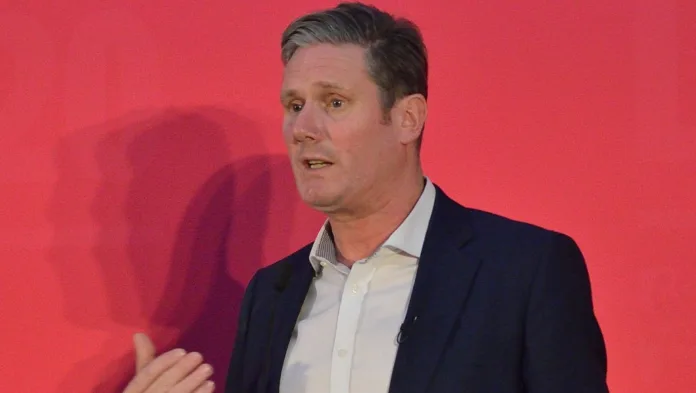Labour leader aims to reassure the public on borders and national security, promising a changed party
Keir Starmer, leader of the Labour Party, addresses lingering voter doubts about his stance on borders and national security in his first major speech of the general election campaign. Despite a significant lead in the polls, Starmer acknowledges the public’s uncertainty regarding Labour’s transformation under his leadership. He emphasizes his commitment to economic, border, and national security, asserting that he has fundamentally changed the party since taking over from Jeremy Corbyn. This speech marks a pivotal moment in Starmer’s bid to become Prime Minister, as he strives to convince the electorate that Labour is ready to govern responsibly and effectively.
Starmer’s speech comes at a critical juncture, with the general election fast approaching. He highlights the failures and divisions within the Conservative Party, positioning Labour as the solution to years of Tory mismanagement. However, he is acutely aware that many voters remain undecided and wary of Labour’s ability to handle key issues. To address these concerns, Starmer outlines his vision for a secure and stable Britain, promising fully funded policies that prioritize the nation’s well-being. This detailed exploration of Starmer’s speech and the reactions it has elicited from various news outlets provides a comprehensive understanding of the current political landscape and the challenges facing the Labour leader.
Embed from Getty ImagesCoverage from The Sun
The Sun’s article highlights Keir Starmer’s acknowledgement of voters’ doubts about his capability to handle borders and national security. Political Editor Harry Cole describes Starmer’s campaign stop in the South East, where he openly admits that despite a 20-point lead in the polls, the election is far from decided. Starmer’s central message is that while the public is dissatisfied with the Conservatives, they still have reservations about trusting Labour with their money, borders, and security.
Starmer insists that he has transformed the Labour Party from its hard-left stance in 2019 to a more centrist and secure position. He stresses the importance of economic security, border security, and national security as the foundations of good governance. Despite these reassurances, Starmer refrains from detailing specific new policies on how he will achieve these goals, which may leave some voters sceptical.
The Sun’s coverage also includes criticism from Veterans Minister Johnny Mercer, who accuses Starmer of trying to “ghost his way into No10” without committing to clear plans. This critique underscores a broader skepticism about Starmer’s ability to deliver on his promises. The article captures the tension between Starmer’s attempts to present himself as a reliable leader and the lingering doubts about his leadership style and policy specifics.
Coverage from The Guardian
The Guardian’s article, penned by Eleni Courea and Aletha Adu, emphasizes Starmer’s declaration that Labour has undergone a permanent transformation under his leadership. In his speech, Starmer targets swing voters in Conservative-held seats in Kent and Essex, regions critical for Labour’s success. He reassures voters that his primary mission since becoming leader has been to change Labour so it can effectively serve the British people.
A significant part of The Guardian’s coverage is dedicated to Starmer’s financial pledges. Shadow Chancellor Rachel Reeves promises that Labour will not raise income tax or national insurance, a move aimed at easing concerns about the party’s fiscal responsibility. She emphasizes that all of Labour’s promises, including increased funding for the NHS, additional police officers, and more teachers, are fully costed and funded.
The Guardian also highlights Labour’s commitment to national security through a proposed 100-day review of threats facing Britain. This review will involve MI5, the police, and Whitehall, demonstrating Labour’s focus on addressing security concerns from hostile states and other threats. The article concludes by noting Starmer’s personal pledge to fight for the voters, reaffirming his commitment to putting the country first.
Coverage from The Independent
David Maddox of The Independent focuses on Starmer’s attempt to quash doubts about his leadership through a “presidential” style campaign. The article delves into the Tory accusations that Starmer’s spending plans could create a £38.5 billion deficit, a claim that underscores the ongoing scrutiny of his economic policies. Starmer’s speech addresses these concerns by promising to fight for the electorate and highlighting the changes he has implemented within Labour.
Maddox outlines the key elements of Starmer’s speech, including his defence of the six “first steps” he plans to implement, which some critics view as lacking ambition. These steps encompass tackling antisocial behaviour, increasing NHS appointments, recruiting more teachers, creating Great British Energy, launching a new border security command, and ensuring economic stability.
The Independent also covers the broader election dynamics, noting the rivalry between Starmer and Prime Minister Rishi Sunak. The article describes the intense campaign environment, with both parties vying for public support. Starmer’s focus on presenting himself as a reliable and transformative leader contrasts with Tory’s efforts to portray him as indecisive and lacking clear plans.
